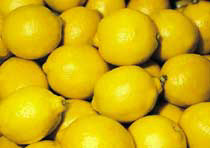Sweet on Lemons: Seven Reasons to Give Healthy Lemons a Loving Squeeze
by www.SixWise.com
Lemons, or "golden apples," were once traded throughout
the world as a rare and precious commodity. They were cultivated
in Palestine, and perhaps Greece, as early as the first century
AD.
The first lemons had many uses. They were, of course, used
to flavor and preserve food, but also their juice was used
for antidotes to poison and venom, women would use them to
redden their lips and sailors ate them to combat scurvy.
In fact, scurvy ran rampant during the California Gold Rush
and miners were willing to pay $1 for one lemon-that's like
paying $17 today! Other people savored lemons for their healing
and soothing properties to the skin and body.
Today about one-fourth of the world's lemons are grown in
the United States (mostly in California). Many Americans enjoy
them in the form of lemonade, but lemon consumption ranked
only eighth among other major fresh fruits, according to the
United States Department of Agriculture (USDA).
|

Lemons can add tangy flavor and intense nutrients to
your meals. Plus, they're great for your skin and keeping
your counters clean!
|
1. Lemons are High in Nutrients
Lemons are an excellent source of vitamin B6, iron and potassium,
and a very good source of dietary fiber and vitamin C. They
also contain calcium, copper, folic acid, magnesium, manganese,
phosphorus and zinc.
2. Lemons are Rich in Bioflavonoids
Lemons are a tasty source of bioflavonoids, which are natural
compounds in some fruits and vegetables. If you haven't yet
heard of them, you soon will. Here are just some of the reasons
why you could benefit from bioflavonoids in your diet:
- They protect against damage caused by free radicals, and
enhance the antioxidant effects of some nutrients.
- They help maintain capillaries and help the blood clot.
Weak capillaries can lead to easy bruising, brain and retinal
hemorrhages, bleeding gums and other abnormalities.
- They may help prevent heart diseases.
- They act as natural antibiotics and may protect the body
from cancer-causing substances.
3. Lemon Juice is Anti-Bacterial
You can use a solution of half lemon juice and half hot water
as an effective gargle for mouth ulcers, canker sores and
sore throats. The anti-bacterial properties make it highly
effective, plus it's inexpensive and pleasant tasting. Lemon
juice can even be dabbed directly on cold sores.
|
When Life Gives You Lemons ... Some Lemony Tips
to Use
- A room temperature lemon will yield more juice
than a cold one.
- Fresh lemon juice can be frozen in ice cube trays
and saved for later use.
- Meat can be tenderized by marinating it in lemon
juice.
- Put lemon wedges inside a chicken and bake for
a tasty meal.
- Squeezing lemon juice on steaming vegetables will
keep the colors bright.
- When using the lemon peel, such as for lemon zest,
wash it thoroughly first.
- Lemons can be kept in a refrigerator crisper for
about four weeks.
- Lemons with green tinges will be more sour, as
they haven't fully ripened yet.
- Did you know that one lemon tree can grow 3,000
lemons in one year?
|
4. They Can Make Your Meals Healthier
Lemon juice is so tangy and flavorful that you can add it
to a variety of foods-while emitting less desirable ingredients
like salt and unhealthy fats. Fresh lemon juice added to your
drinking water is an easy and tasty way to add nutrients to
your diet and makes a great replacement for soda or other
sweetened beverages.
5. Lemons May Lower Your Cholesterol and Blood Sugar Levels
Lemon pulp and skin contains pectin, a compound that studies
have found may reduce cholesterol levels and lower blood sugar
levels in diabetics. Modified pectins may also prevent the
spread of cancer.
6. Lemon Juice Makes an Excellent Cleanser
Lemon juice is antiseptic, meaning it fights disease-causing
bacteria. A combination of baking soda, lemon juice and water
makes a great natural and safe cleaner (many
common household cleaners pose real health dangers) that
can be used on countertops, microwaves, showers, bathrooms
and more. For an even better clean, you can use it in conjunction
with PerfectClean's
Terry Cloths (or you can even just use them dry!).
Lemon juice also acts as a bleaching agent that can be used
to remove stains from cotton or linens.
7. Lemons are Good for Your Skin
If you have acne, rubbing slices of lemon onto your skin
and then rinsing with tepid water will help clear pimples.
Because lemons are acidic, be careful using this remedy if
you have sensitive skin or try diluting it with water. Lemons
are also a natural exfoliant and will help to remove dead
skin cells to reveal brighter skin.
So when life gives you lemons ... don't just make lemonade.
Add a squirt of lemon juice to your water, a slice of lemon
to your fish or some grated lemon peel to your next batch
of cookies. Adding lemons to every food you can think of is
a great way to get some added nutrition and added taste for
very little added cost or effort.
Sources
Lemons
History
of Lemons
Lllemonicious!
LemonFlower
Lemon
Production and Consumption